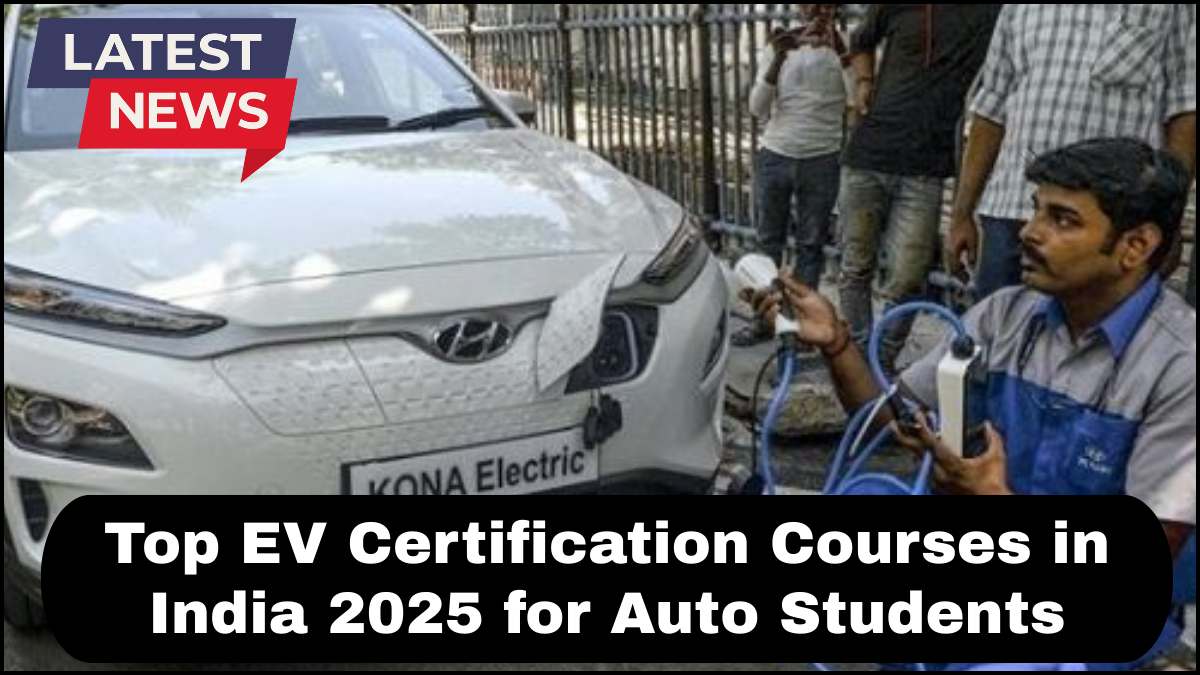As the electric vehicle (EV) industry accelerates toward the future, the demand for skilled professionals is surging across India. Auto students aiming to stay ahead must gear up with the right EV certification courses that offer both foundational knowledge and hands-on experience. These courses are crucial for upskilling in a rapidly evolving automobile sector transitioning from internal combustion engines to electric mobility.

Here’s a detailed look at the top EV certification programs in India in 2025, tailored for auto engineering students and professionals looking to stay competitive.
Why EV Certification Courses Are Essential in 2025
The Indian government’s push toward green mobility, combined with rising fuel prices and environmental concerns, has fueled exponential growth in the electric vehicle market. Traditional automotive skills alone are no longer enough. Engineers must now understand electric drivetrains, battery management systems, charging infrastructure, and EV-specific safety protocols.
EV certification courses fill this critical gap by providing industry-relevant knowledge, hands-on training, and updated technological insights. For students in automobile engineering, these certifications act as career accelerators, unlocking roles in R&D, design, diagnostics, and production.
1. IIT Madras – eMobility and Electric Vehicle Engineering Certification
Mode: Online + Hybrid Lab Sessions
Duration: 3 to 6 months
Affiliation: Centre for Outreach and Digital Education (CODE), IIT Madras
IIT Madras offers a specialized certification in electric mobility tailored for engineering students and professionals. The curriculum covers EV powertrains, control systems, energy storage, and real-world applications. It includes simulation tools like MATLAB and Simulink, giving learners a strong technical foundation.
Highlights:
-
Access to lectures from top IIT faculty
-
Emphasis on industrial applications and design
-
Strong placement assistance through IIT’s industry partners
2. ASDC – Electric Vehicle Technician Certification
Mode: Classroom + Practical Lab
Duration: 3 months
Affiliation: Automotive Skills Development Council (ASDC)
ASDC’s certification focuses on practical training for technicians and students entering the automobile field. The program is aligned with India’s National Skill Qualification Framework (NSQF) and emphasizes component-level understanding and diagnostics of EVs.
Key Modules:
-
EV safety and servicing
-
Battery and BMS operation
-
Charging protocols and troubleshooting
This is ideal for those seeking hands-on roles in service centers, dealerships, and fleet maintenance.
3. ISIE India – Professional Certification in Electric Vehicle Design and Development
Mode: Online Live + Weekend Workshops
Duration: 4 to 6 months
Partner Institutions: Multiple engineering colleges and industry partners
ISIE India has carved a niche by offering EV certification courses with a strong R&D focus. Their flagship program blends theory with extensive project work, including the design of functional EV prototypes.
Program Features:
-
CAD and ANSYS simulations
-
Live industry mentorship
-
Capstone project in collaboration with OEMs
It’s particularly suited for final-year students and early-career engineers looking to build real-world experience.
4. Skill-Lync – Post Graduate Program in Electric Vehicle Design
Mode: 100% Online
Duration: 8 months
Focus Area: Engineering software + EV systems
Skill-Lync’s advanced PG program targets core automotive engineers aiming to pivot into EV design. The modules include electric machine design, thermal management systems, and power electronics.
Benefits:
-
Project-based learning using industry tools like SolidWorks, Python, and MATLAB
-
Dedicated career support and resume workshops
-
Option for EMI-based course fee payment
5. DIYguru – Certified Electric Vehicle Nanodegree Program
Mode: Online Self-paced
Duration: 3 to 6 months
Certification Partner: ASDC & E-Mobility Companies
DIYguru’s EV certification course is one of the most popular in India, especially for its flexibility and industry validation. The program is updated annually to include the latest EV trends and policy developments.
Course Modules:
-
Fundamentals of EV architecture
-
EV motors and control systems
-
Charging infrastructure and policy landscape
A perfect choice for students who want a self-paced learning path with a recognized credential.
Additional Upskilling Opportunities
In addition to structured EV certification courses, students should explore:
-
Internships with EV startups: Real-world exposure to the challenges of EV deployment
-
Online platforms like Coursera & edX: International EV programs from MIT, TU Delft, etc.
-
Hackathons & student competitions: Formula-E, E-Baja, and other contests foster design and innovation skills.
How to Choose the Right EV Course
When selecting an EV certification course, consider:
-
Curriculum relevance: Ensure it covers emerging technologies and regulatory standards.
-
Mode of delivery: Balance your academic or work schedule with course flexibility.
-
Industry recognition: Certifications backed by reputed institutions or councils hold more weight.
-
Hands-on components: Practical exposure is crucial for employability in the EV space.
FAQs – EV Certification Courses in India
Q1: Are EV certification courses worth it for automobile students?
Yes. These certifications help bridge the skill gap and make you job-ready for the rapidly evolving electric vehicle industry.
Q2: Do these courses require prior work experience?
Most beginner-level programs don’t. However, advanced courses like Skill-Lync’s PG program may require a strong technical background.
Q3: Can I pursue an EV course while studying full-time?
Absolutely. Many EV certification courses are designed to be flexible, offering weekend or self-paced learning options.
Q4: What kind of jobs can I get after completing an EV certification?
You can apply for roles such as EV design engineer, battery systems analyst, vehicle diagnostics technician, and more.
Q5: Is there government support for EV skill development?
Yes. Schemes like Skill India and partnerships through ASDC and NSDC offer subsidized training and certifications in EV technology.
click here to learn more